Seattle Office Assets Trade for Low Prices
Meanwhile, the market's investment volume nearly tripled, CommercialEdge information shows.
Seattle’s office market is experiencing a dynamic year, marked by significant deliveries and developments. Year-to-date through August, the metro ranked second among gateway markets for completions, with 3.8 million square feet coming online, CommercialEdge data shows.

The market’s transaction volume increased threefold on a year-over-year basis. Despite that, the average price per square foot remains one of the lowest among peer metros. The Emerald City is also facing vacancy-related struggles, with 24.9 percent of its office space remaining unoccupied, more than 5 percent higher than the national average.
Development increases have posed increasing concerns, as the office sector continues to hurt. As a result, office-to-residential conversions picked up as a means of providing housing stock in urban markets while resolving some of the concerns of office owners. CommercialEdge introduced a tool to assess the viability of repurposing properties in various markets. According to the data provider’s Conversion Feasibility Index, Seattle falls top range, with approximately 2.4 percent of its office inventory showing strong potential for conversion.
Second-largest delivery total nationwide
Year-to-date through August, Seattle’s office sector saw almost 3.8 million square feet of office space delivered across 10 properties, a fourfold increase year-over-year. These completed projects also accounted for 2.1 percent of the metro’s total stock.

Among gateway markets, Boston was the only one to surpass the Emerald City, recording roughly 4.3 million square feet in office completions. Los Angeles (731,234 square feet), San Francisco (1.9 million square feet) and Manhattan (2.9 million square feet) were at the opposite end.
Recently, Skanska delivered The Eight, a 729,000-square-foot office building in Bellevue, Wash. Expected to achieve a LEED Platinum certification, the 25-story tower was more than 80 percent preleased prior to its completion, showing that leasing transactions are still closing for Class A assets with high-end amenities.
Seattle sees fewer developments underway
Seattle’s office sector had almost 2.1 million square feet under construction as of August, accounting for 1.4 percent of total stock. The rate was slightly above the 1.0 percent national average.
The metro lagged behind other gateway markets, with Boston (11.2 million square feet) taking the spotlight once again. Miami (2.8 million square feet), Manhattan (2.7 million square feet) and Washington, D.C. (2.2 million square feet) also performed better.
Microsoft is still working on the redevelopment of its main campus in Redmond. The company is replacing 12 older office buildings with 17 new ones that would total about 3 million square feet, with completion scheduled in 2025. Originally, plans called for a 1.1 million-square-foot expansion as well, but that fell through last year.
Higher transaction volume for fairly low prices
Year-to-date as of August, Seattle’s office sector registered $399 million in investment volume. Assets changed hands for $190 per square foot on average, commanding one of the lowest prices among gateway metros.
Los Angeles led with $437 per square foot, followed by Manhattan ($386 per square foot) and San Francisco ($278 per square foot). However, the metro did surpass the $173 per square foot national average.
Last month, The Smith Tower, the first skyscraper to be built in Seattle, changed hands. Goldman Sachs sold the 42-story tower to a group of local investors led by GT Capital. The building measures about 268,700 square feet and was completed in the 1910s.
Office vacancies keep climbing
Seattle’s office vacancy rate continued to grow this year, reaching 24.9 percent at the end of August. This figure was more than 5 percent higher than the U.S. average. San Francisco fared the worst among gateway markets, with 27.6 percent of vacant space, while Manhattan (16.6 percent), Los Angeles (16.7 percent) and Chicago (19.0 percent) performed better.

In June, TikTok decided to expand its office space at Lincoln Square North Tower, a 27-story tower in downtown Bellevue. The social media giant will add 150,000 square feet to the 132,000 square feet it already committed to in January. The new space was previously leased by Microsoft, which relinquished the offices last December.
Additionally, tech companies are still looking to expand their space. Last month, an AdTech firm signed a 68,880-squre-foot lease at The Eight, one of Skanska’s buildings in Bellevue. Move-in is expected in the second quarter of next year.
Coworking rate on par with the national figure
As of August, Seattle’s coworking sector comprised 2.9 million square feet of shared space, accounting for 1.9 percent of the metro’s total inventory. Among peer markets, the Emerald City surpassed only Washington, D.C. (1.6 percent), while Manhattan (2.3 percent) and Los Angeles (2.1 percent) were at the opposite pole. However, the metro’s figure was slightly bigger than the 1.8 percent national average.
The flex office providers with the largest footprints in Seattle remained WeWork with 447,121 square feet and Regus with 420,608 square feet. These operators were followed by extraSlice (269,403 square feet) and Industrious (151,740 square feet).








You must be logged in to post a comment.